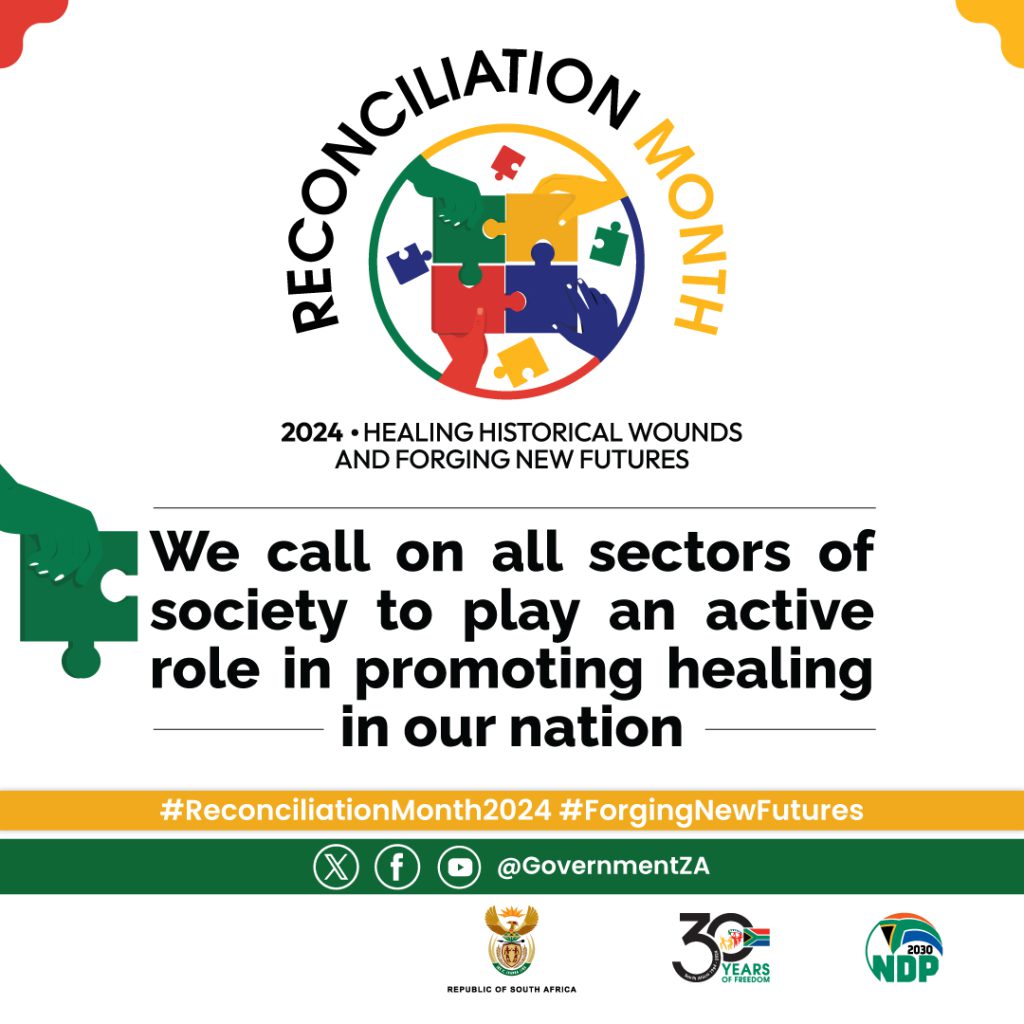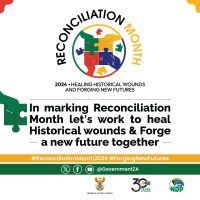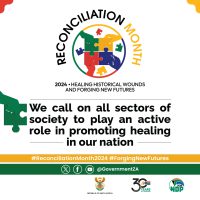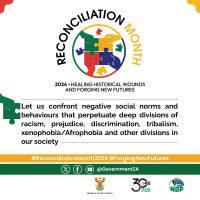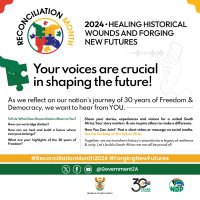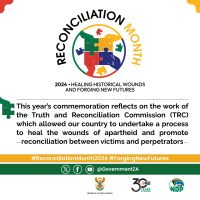Reconciliation Month 2024
The 2024 National Day of Reconciliation will take place on 16 December 2024 in Vredendal, Matzikama Local Municipality in the Western Cape. The event serves as a clarion call for all sectors of society to play an active role in promoting healing of the nation and will be convened under the theme: “Healing Historical Wounds and Forging New Futures”.
In keeping with the spirit of the theme, President Cyril Ramaphosa will deliver a keynote address on Reconciliation Day followed by a dialogue from widows of our nation’s freedom fighters. Through these discussions, we hope to draw wisdom and courage to move forward in building the country envisaged by our forebearers.
In South Africa, we not only commemorate Reconciliation Day but also dedicate the entire month of December to reconciliation. Throughout the month we will reflect on our history, acknowledge the contribution of our nation’s veterans and work to heal wounds of past injustices.
This year’s commemoration coincides with our 30 Years of Democracy celebration and we will also reflect on the work of the Truth and Reconciliation Commission (TRC), which helped our country deal with the wounds inflicted by apartheid. The TRC advanced peace, reconciliation, tolerance and social cohesion.
Our Reconciliation Month commemoration takes place three months after we received 35 human remains of South Africans who were buried while in exile in Zimbabwe and Zambia. The next phase of the project will focus on the repatriation of the remains of South Africans buried in Angola
This initiative is crucial for national healing, allowing families to find closure and honour the memory of those who fought for freedom and justice. Moreover, this project is part of our commitment to honour and restore the legacy of those who sacrificed their lives for the country’s freedom.
KEY MESSAGES SUPPORTING STATEMENTS
Striving for a socially cohesive nation to heal the injustices of the past.
• Reconciliation Day is a clarion call for all sectors of society to play an active role in promoting healing in our nation.
• This year’s commemoration will focus on collective efforts of government and the people in advancing reconciliation, nation-building, social cohesion, healing and forgiveness.
• This year’s theme: “Healing Historical Wounds and Forging New Futures”, underscores the need for inclusive nation building that allows us to acknowledge those who selflessly sacrificed their lives for freedom.
• We must continue to fight elements of racism, prejudice and discrimination which continue to divide our communities.
• During this Reconciliation Month, we call for everyone to play an active role in promoting ubuntu, moral regeneration and reconciliation.
• Reconciliation Day is an opportunity to celebrate how far we have come in building a cohesive society and to continue to realise a society founded on non-racialism.
• We must fulfil the promise of building a united, non-racial, non-sexist and prosperous country in which all who live in it are treated fairly.
• The Truth and Reconciliation Commission (TRC) was a deliberate move to heal past hurts and injustices.
• Post-1994, government created the TRC with the core mission to uncover truths about severe human rights violations by the brutal apartheid regime.
• It was established to provide the foundation for a peaceful transition to democracy.
• Led by the late Archbishop Desmond Tutu, the TRC was a progressive initiative that allowed our country to mourn and to heal.
• It was a platform for the voices of the victims and perpetrators to be heard on acts of injustice committed during apartheid.
• The TRC sought to seek justice and dignity for the victims and their families, while promoting nation building and reconciliation.
• Let us build on the lessons learned from the TRC and work together to build the future South Africa we want
The GNU offers a unique opportunity for South Africans to unite and build a better future for all.
• This vision of a nation reconciled is embedded in our democratic Constitution.
• Reconciliation Day and month offers us an opportunity to reach out to one another to deal with our past, reconcile and build a new nation.
• During this month, we advocate for peace, stability and safer communities, as well as the protection of the most vulnerable especially women and children.
• Government emphasises reconciliation through inclusive governance and social transformation.
• Government aims to further advance reconciliation through a proposed National Dialogue, which will help to guide the country to a new vision.
Together we can re-imagine a healed nation, united in our diversity.
• We must continue the work of forgiveness, reconciliation and healing to safeguard our hard-fought democracy for future generations.
• Our reconciliation should be linked to transforming our society by broadening the participation of all South Africans in the development of the country.
• Forging a new future for everyone requires us to protect the gains of our democracy while ensuring that we all enjoy human dignity and the progressive realisation of socio-economic rights.
• Reconciliation requires that we end inequality in all its forms, while working to ensure access to water, education, skills, employment, housing, health care and basic services.
• Moving forward we must ensure that social justice, equity and the alleviation of poverty is extended to all, leaving no one behind.
• Collectively we must ensure sustainable inclusive development that improves the lives of all South Africans through mentoring and skills development.
Info Graphics:
• In marking Reconciliation Month lets work to heal historical wounds and forge a new future together.
• The 2024 National Day of Reconciliation is set to take place on 16 December 2024 in Matzikama Local Municipality in the Western Cape.
• We call on all sectors of society to play an active role in promoting healing in our nation.
• Let us confront negative social norms and behaviours that perpetuate deep divisions of racism, prejudice, discrimination, tribalism, xenophobia/Afrophobia and other divisions in our society.
• This year’s commemoration reflects on the work of the Truth and Reconciliation Commission (TRC) which allowed our country to undertake a process to heal the wounds of apartheid and promote reconciliation between victims and perpetrators.

